

Now that Mitt Romney has clinched his position as the GOP presidential candidate, it’s time more than ever for Romney to avoid talking about the health care reform measure he created as Governor of Massachusetts.
You remember President Obama’s health-care legislation, the Affordable Care Act (ACA), the one that passed through Congress as smoothly as a kidney stone, thanks to shrill conservative opposition? Key parts of that act were lifted straight from Gov. Romney’s measure, but Mitt can’t afford that association, given the Right’s steady vilification of the plan as “socialism.” Which is why Romney has been running around attacking “Obamacare” instead.
Some Republicans are reading the polls and surfacing the idea of legislation to replace the Obama Administration’s ACA.
It seems their idea is to retain the most popular aspects–covering young people until they are 26, close the Medicare “doughnut hole” that requires patients to pay more for their medications and guarantee coverage despite pre-existing conditions.
» Read more about: Bad Medicine: Walmart's Rx for Employee Health Care »
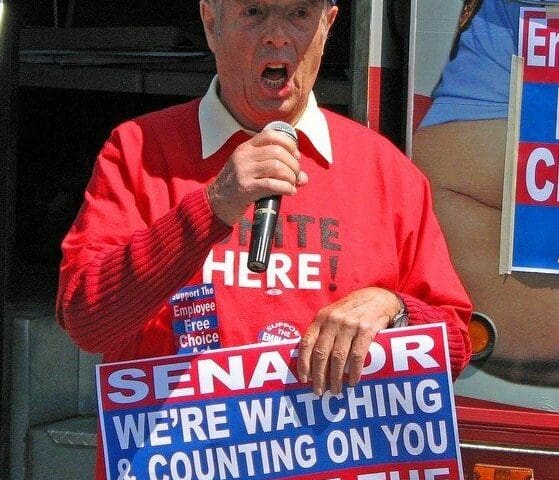
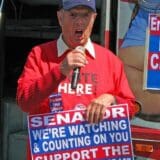
File this under the We Couldn’t Have Said It Better Ourselves Department: Op-ed columnist Joe Nocera articulated on the very respectable pages of the New York Times what many of us have known for years: Unions are good for the economy. Well, no – make that, unions are essential for the economy to work for everyone. Nocera, the famously contrarian business writer, talks about his picket-line-walking parents and his union-solid Rhode Island birthplace – but how, as a member of America’s post-war educated class, he came to view organized labor “with mild disdain.”
The madeleine that stokes his remembrance of union things past is The Great Divergence, Timothy Noah’s new book about income inequality. After confessing to holding an outlook once similar to Noah’s early views of labor as “a spent force,” Nocera now agrees with him that liberals have turned their backs on unions with terrible consequences.


 While hardly surprising to anyone who read the polls, yesterday’s victory by Republican Governor Scott Walker was a body blow to Wisconsin unions and to American workers. Within Wisconsin, Walker’s victory ensures that his law repealing collective-bargaining rights for public employees will stay on the books, and if Republicans maintain their hold on the state senate—four of their senators faced recall elections, and as I write this at least three have survived—they will, at least in theory, be able to go forward on other parts of their Social Darwinist agenda. Whether they will—and whether they opt to go after private-sector unions, too, with right-to-work legislation—remains unclear. Such a move on Walker’s part, coming on the heels of the most divisive 18 months in the state’s history, would only escalate what is already a political civil war. Even Walker may think it the better part of valor to pass on that for now.
While hardly surprising to anyone who read the polls, yesterday’s victory by Republican Governor Scott Walker was a body blow to Wisconsin unions and to American workers. Within Wisconsin, Walker’s victory ensures that his law repealing collective-bargaining rights for public employees will stay on the books, and if Republicans maintain their hold on the state senate—four of their senators faced recall elections, and as I write this at least three have survived—they will, at least in theory, be able to go forward on other parts of their Social Darwinist agenda. Whether they will—and whether they opt to go after private-sector unions, too, with right-to-work legislation—remains unclear. Such a move on Walker’s part, coming on the heels of the most divisive 18 months in the state’s history, would only escalate what is already a political civil war. Even Walker may think it the better part of valor to pass on that for now.


When I arrived in this country, you conform to what is given. I came by myself. It’s very difficult living here without knowing anyone, not knowing where a store is, not having money to buy water or bread. When you find a job, if they offer you $50, you don’t have to think about it – you need this money, so you take it.
– Jose Juan Romero, restaurant worker
and former food-processing worker
If you’re like me, you probably try to watch what you eat, eat healthy, eat organic when possible, shop at the farmers’ market to support local family farmers… but have you thought about the workers who do the work to provide the food on your plate?
When I first became a vegetarian almost 20 years ago, I didn’t think about the workers. I made an ethical decision to change the way I ate,

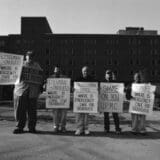
All the bad things you heard about the 2012 Whitney Biennial, which closes June 10, are too true. For some time now the Biennial has been a favorite piñata of conservative critics who’ve bristled at the introduction of Lowbrow art and other populist trends. This 76th biennial, however, annoyed a number of reviewers across the spectrum. Huffed the Village Voice:
Composed of arty ephemera, light musings on decades-old conceptual processes, and bogus curatorial gestures that conflate sculpture with performance and installation with music—the mind boggles at the notion of turning over most of the museum’s fourth floor to genre-mixing “free collage,” i.e., choreographer Sarah Michelson’s noodling at preview time—the 2012 biennial promulgates a dark sensibility as an artistic foil to America’s Tim Tebow culture.
Part of the reason some New Yorkers were riled up was the show’s corporate provenance: It was bankrolled by Sotheby’s and Deutsche Bank,
» Read more about: Closings: The Whitney Biennial's Dark Sparkle »


Here’s a headline you won’t see, but should: “Scott Walker Spent 88 percent of the Money to Get 53 Percent of the Vote.”
Political pundits will spend the next few days and weeks analyzing the Wisconsin recall election, examining exit polls, spilling lots of ink over how different demographic groups — income, race, religious, union membership, gender, party affiliation, independents, liberals/conservatives/moderates, etc — voted on Tuesday.
But the real winner in Wisconsin on Tuesday was not Gov. Scott Walker, but Big Money. And the real loser was not Milwaukee Mayor Tom Barrett, but democracy.
Walker’s Republican campaign outspent Barrett’s Democratic campaign by $30.5 million to $4 million — that’s a 7.5 to 1 advantage. Another way of saying this is that of the $34.5 million spent on their campaigns, Walker spend 88 percent of the money.
Walker beat Barrett by 1,316,989 votes to 1,145,190 votes — 53 percent to 46 percent (with 1 percent going to an independent candidate).
» Read more about: Wisconsin: Buying Democracy, One Vote at a Time »

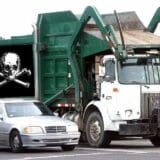
Last week, more than 30 citations were issued by the California Occupational Safety and Health Administration (Cal/OSHA) to a waste recycling company called American Reclamation, Inc., its subsidiaries and a temporary employment agency. The citations dealt with serious violations at a material recovery facility in Los Angeles, which is where trash is sorted by hand to remove recyclables from other waste.
Cal/OSHA cited the company for violations of health and safety standards,
failure to train workers properly and a host of other unlawful practices. I’m happy that our state health and safety enforcers caught these violations, but I fear that the lack of enforcement resources in California means many other violations at other facilities are slipping through the cracks.
Coming off a thrilling victory on banning plastic bags, the City of L.A.’s next waste discussion centers on taming the currently out-of-control open permit system that governs how waste is collected for business and large apartment buildings.
» Read more about: Waste Violations Hurt L.A. Workers and the Environment »
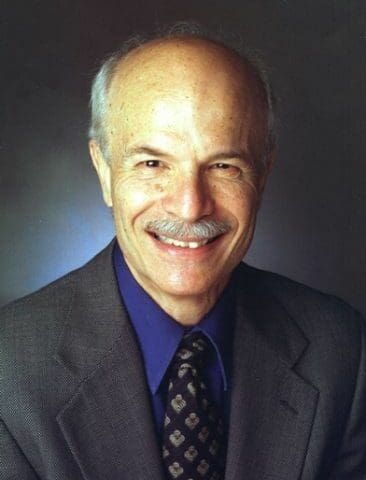

Since his sudden death in April, I’ve been trying to imagine the health care movement without Rick Brown’s wise counsel, coherent advocacy, and perfect research. E. Richard Brown was a professor of Public Health at UCLA whose research and advocacy touched millions of lives. As a health activist and advocate, I worked with Rick to save California’s county hospitals and health centers, and I use his research, especially the California Health Interview Survey (CHIS) to illustrate the health care needs of various populations in California when I write grant proposals for nonprofit organizations. He was always happy to give me advice about how to frame an argument, and he was always willing to meet with policy makers when activists needed an authority to support them.
The memorial service held on May 29 filled UCLA’s Schoenberg Hall. The crowd included the health activists, labor leaders, UCLA faculty colleagues, and politicians who worked with Rick to gain recognition of health care as a basic human right,
» Read more about: E. Richard Brown: Health Advocate Leaves a Legacy of Justice »


The 20th anniversary of the Los Angeles riots has triggered a number of fascinating reports examining the underlying causes of the unrest and the changes (in attitudes and actions) that have taken place in the past two decades.
Scholars at the University of Southern California produced a report called L.A. Rising: The 1992 Civil Unrest, the Arc of Social Justice Organizing, and the Lessons for Today’s Movement Building. Their counterparts at L.A.’s Loyola Marymount University, published 20th Anniversary of the Los Angeles Riots Survey. And my colleagues at the Los Angeles Alliance for a New Economy (on whose board I proudly serve) published a series of reflections by L.A. activists called Rage and Reflection: Meditations on LA’s 1992 Civil Unrest and the Ongoing Transformation of a City.
» Read more about: "Riots" or "Rebellion": What We Learned from 1992 »


“More deeply still, nonviolence is a spiritual challenge of epic proportions. It calls upon the soul’s authentic longing for heroism, for risking one’s life for an infinite stake, for self-transcendence in giving oneself to another.” – Walter Wink
After Reinhold Niebuhr succumbed to Cold War fever, there was no longer a major voice in Christian ethics among Protestants. In seminary, I myself had to read Paul Ramsey, who couldn’t get any closer to examining the ethics of war than resuscitating Just War Theory from the late days of the Roman Empire. Most of us who opposed the Vietnam War were stuck with a rationale that this-war-in-particular was unjust and therefore should be stopped. Since no one could articulate a thorough critique from a non-violent perspective, we were flying by the seats of our intellectual pants.
Little did I know that alongside mainstream Christian ethics, hidden somewhere in the obscure hallways of academia,
» Read more about: Remembering Walter Wink: Ethical Thought behind Non-Violence »